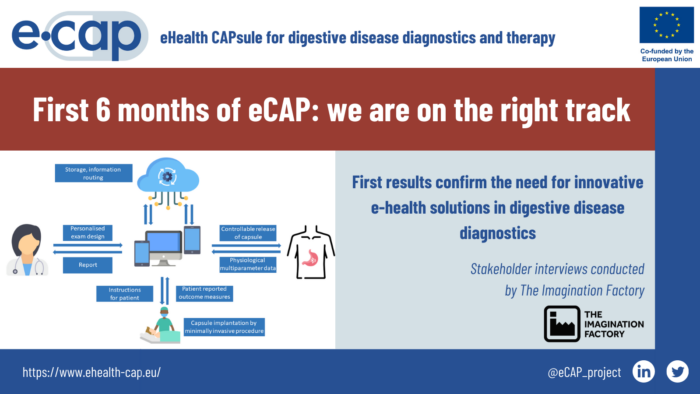First six months of eCAP confirm the need for innovative e-health solutions in digestive disease diagnostics
October marks the end of the first six months of eCAP – a collaborative research and innovation project determined to tackle the worldwide gastroesophageal reflux (GERD) epidemic by developing a diagnostic smart capsule connected to an e-health platform. On the occasion of this milestone, the consortium partners met over a day-long teleconference to discuss project progress and plan next steps.
Over the course of the last half a year, the consortium has successfully completed the activities laying the groundwork for eCAP specifications and user design. Moreover, partners have undertaken the initial mapping of the regulatory landscape and established the methodology for the health technology assessment and cost-benefit analysis of eCAP. This scoping work is aimed at ensuring the project results in meaningful innovation catering to the needs of a growing patient population on the one hand, and health care systems stretched for resources on the other.
The stakeholder interviews conducted by Imagination Factory indicate eCAP consortium is on the right track. Both, patients and clinicians look forward to innovative technologies to increase the accuracy and ease of use of tests utilized for diagnosing gastroesophageal reflux. While patients would appreciate improved comfort, clinicians and nurses stress the need to cut the inefficiencies and costs related to the devices currently on the market. The stakeholder input gathered will feed into the mechanical design of the smart capsule, the work for which has been kicked off under the leadership of Tyndall National Institute.
At the M6 Progress Meeting, the consortium was also happy to welcome the contributions from its freshly formed External Advisory Board and Ethics Advisory Board. The Boards are composed of renowned experts from fields ranging from gastroenterology and medical devices to regulatory and ethics.
Members of eCAP External Advisory Board:
- Christy Dunst, M.D.: Esophageal surgery specialist at Oregon Clinic
- Tom De Meester, M.D.: Professor and Chairman Emeritus at the Department of Surgery of Keck School of Medicine, University of Southern California
- Barry Weitzner: Senior fellow of Research and Development at the Endoscopy Division of Boston Scientific
- Stuart Jon Spechler, M.D.: Chief of Division of Gastroenterology and Co-Director of Center for Esophageal Diseases at Baylor University Medical Center at Dallas; Co-Director of Center for Esophageal Research at Baylor Scott & White Research Institute
- Fergal McCaffery, PhD: Founder andDirector of the Regulated Software Research Centre at Dundalk Institute of Technology; Professor of Computing Science at Dundalk Institute of Technology (DkIT); Co-founder of Nova Leah
Members of eCAP External Ethics Advisory Board:
- Peter Angelos, M.D., PhD, FACS, MAMSE: Linda Kohler Anderson Professor of Surgery and Surgical Ethics; Director of MacLean Center for Clinical Medical Ethics
- Beatrice Gabriela Ioan, PhD: Professor and PhD Coordinator at Grigore T.Popa University of Medicine and Pharmacy
- Philipp Kellmeyer, M.D., Dr Med, MPhil: Group Leader at Human-Technology Interaction Lab;Research Fellow at Freiburg Institute for Advanced Studies (FRIAS) Responsible Artificial Intelligence of University of Freiburg
- Jennifer Eckhoff, M.D.: Research Fellow at Surgical Artificial Intelligence and Innovation Laboratory of Massachusetts General Hospital
We look forward to continuing the stimulating conversations at the eCAP annual meeting in Strasbourg in April. Until then, the technical work on the capsule design and eCAP e-health platform will continue – this is only the beginning!
